The Samsung PM981 SSD Review (512GB, 1TB): Next Generation Controller And 3D NAND
by Billy Tallis on November 30, 2017 9:02 AM ESTAnandTech Storage Bench - The Destroyer
The Destroyer is an extremely long test replicating the access patterns of very IO-intensive desktop usage. A detailed breakdown can be found in this article. Like real-world usage, the drives do get the occasional break that allows for some background garbage collection and flushing caches, but those idle times are limited to 25ms so that it doesn't take all week to run the test. These AnandTech Storage Bench (ATSB) tests do not involve running the actual applications that generated the workloads, so the scores are relatively insensitive to changes in CPU performance and RAM from our new testbed, but the jump to a newer version of Windows and the newer storage drivers can have an impact.
We quantify performance on this test by reporting the drive's average data throughput, the average latency of the I/O operations, and the total energy used by the drive over the course of the test.
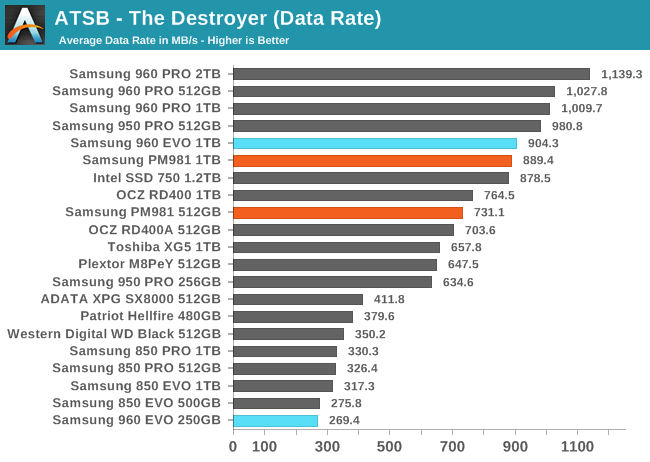
The average data rate of the 1TB Samsung PM981 on The Destroyer is comparable to the 960 EVO 1TB and well ahead of any competing TLC-based drives like the Toshiba XG5. The 512GB PM981 is slower by a typical amount, and still faster than any of the non-Samsung drives of that size.
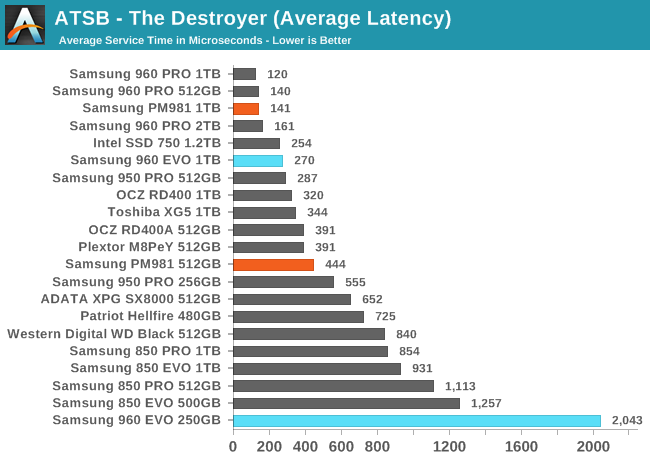
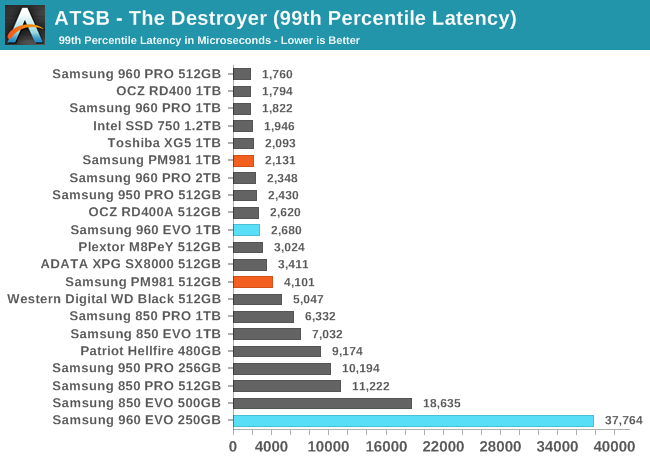
The 1TB PM981 shows a substantial improvement over the average and 99th percentile latency scores of the 960 EVO, putting it close to the 960 PRO. The 512GB PM981 isn't as impressive, with latency scores that fall behind most MLC-based NVMe SSDs.
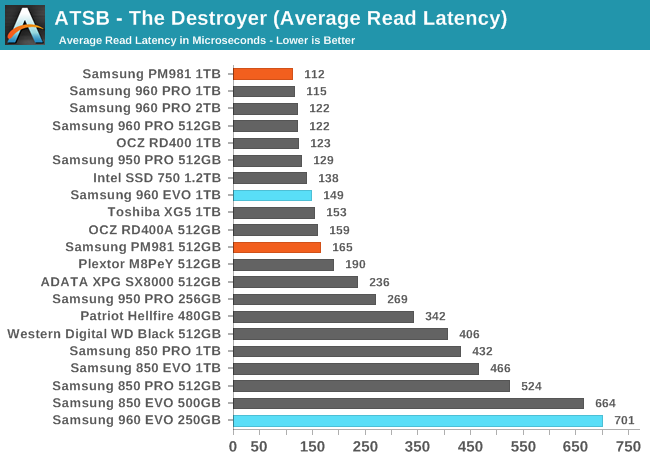
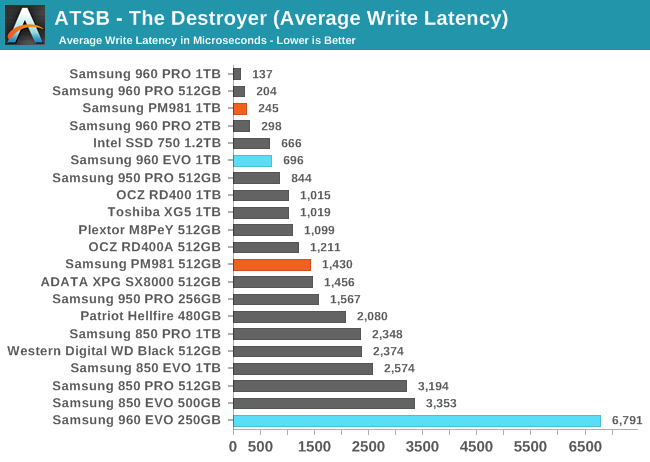
The 1TB PM981 sets a new record (among flash-based SSDs) for average read latency on The Destroyer, shaving a few microseconds off the 960 PRO's performance. The average write latency can't quite keep up with the MLC-based 960 PRO that doesn't use SLC write caching. The smaller 512GB PM981 is competitive with most similarly-sized MLC-based drives, but slower than Samsung's 960 PRO.
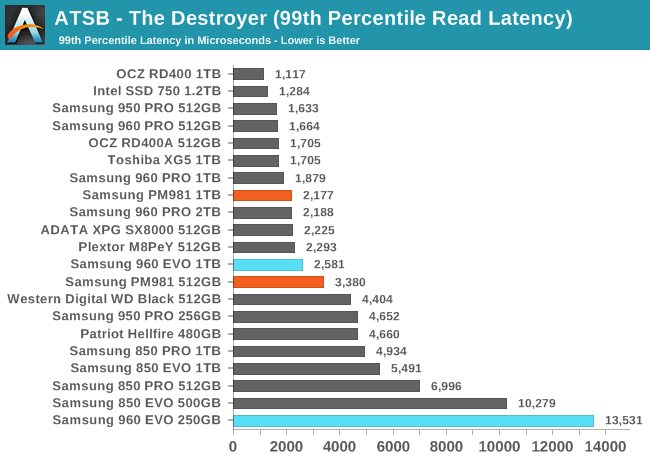
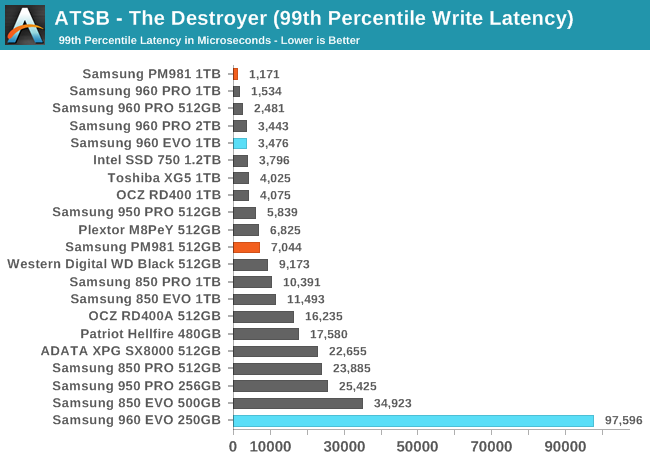
Samsung's 99th percentile read latency is nothing special, though the PM981 does offer clear improvement over the 960 EVO. The 99th percentile write latency of the 1TB PM981 is excellent and far better than the 1TB 960 EVO. The 512GB PM981 is clearly the fastest TLC-based drive of that size that we've tested, but it doesn't quite match the 99th percentile latency scores of the MLC-based competition.










53 Comments
View All Comments
tsk2k - Thursday, November 30, 2017 - link
It's all about that 3D-Xpoint nowadays.rsandru - Thursday, November 30, 2017 - link
Speaking of which, can we have the Optane 900p data points back in?boeush - Thursday, November 30, 2017 - link
Hmm, yeah - all about 1 TB 3D XPoint - how much would that cost, again, and what's the retail availability of the M2 form-factor?ddriver - Thursday, November 30, 2017 - link
Unfortunate after so many years of complete domination samsung is not even trying anymore. It will be TLC all over in order to squeeze out every cent worth of profit from that advantage.Spunjji - Thursday, November 30, 2017 - link
"...the PM981 has caught up to or surpassed the MLC-based 96x drives on many tests, setting new records not just for TLC-based drives but for client SSDs as a whole."Right; they're clearly not trying at all. :|
mapesdhs - Thursday, November 30, 2017 - link
"...in order to squeeze out every cent worth of profit from that advantage."That's called business. If rivals don't like it, they should make something better and bring it to market. I might not like how Samsung has managed its pricing, etc., but if I were them, then based on fiduciary duty to shareholders I would do exactly the same thing.
ddriver - Thursday, November 30, 2017 - link
They are not, but it requires north of a simpleton's way of looking at it to see it. Because they could have kept MLC and offered a significant boost in performance thought the entire drive.And the claim that using TLC it catches up on MLC drives is just nonsense. There is no engineering miracle here. There is simple caching at play, the drive doesn't touch TLC for the duration of AT's flimsy test suite. Once the drive runs out of cache performance quickly gets abysmal - about 750 mb/s once it gets to the point of using TLC directly. Not to mention the reduced endurance.
Granted most casual consumers won't be doing anything as data intensive, but many prosumers will, which means that current consumer grade drives are no longer adequate for prosumer applications, which wasn't the case with the previous generation, indicating that samsung is indeed taking a step back.
And things are not looking too well in the more affordable enterprise range neither, its lousy with TLC as well. Meaning that samsungs devolution now forces prosumers to shop for the much more expensive high-end enterprise storage solutions.
I don't mind TLC. What I mind is depriving the market of MLC. I didn't mind paying the MLC premium for the 960 PRO over the EVO. It was a good deal. I mind that they are taking that deal away from the market. And if you had 2 properly working brain cells you'd mind that too.
MFinn3333 - Thursday, November 30, 2017 - link
"There is simple caching at play, the drive doesn't touch TLC for the duration of AT's flimsy test suite."What? Here is the destroyer benchmark's description...
Total GB Read: 1583.02 GB
Total GB Written: 875.62 GB
Total IO Operations: 49.8 million
Queue depth is 50% 1 depth.
What is your definition of flimsy?
mkaibear - Friday, December 1, 2017 - link
This is deedee, his definition of "flimsy" is "if there is any possible way in which I can be right, then I meant that".ddrіver - Thursday, November 30, 2017 - link
Exactly. The products are better because time passes on and technology advances, not because they are actually struggling to make them better. Profit is their number one concern performance just happens to increase from time to time...